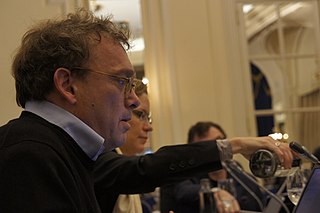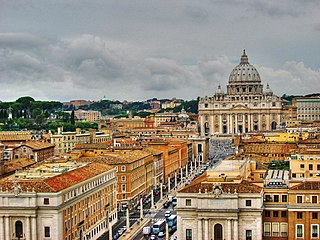God is Back: How the Global Revival of Faith Is Changing the World is a 2009 book by John Micklethwait and Adrian Wooldridge which argues against the secularization thesis and claims that there is a global revival of faith has started in the late twentieth century.
Richard John Micklethwait is editor-in-chief of Bloomberg News, a position he has held since February 2015. A British journalist, he was previously the editor-in-chief of The Economist from 2006 to 2015.

Adrian Wooldridge is the Management Editor and, since 1 April 2017, the 'Bagehot' columnist for The Economist newspaper. He was formerly the 'Schumpeter' columnist. Until July 2009 he was The Economist's Washington Bureau Chief and the 'Lexington' columnist.

Secularization is the transformation of a society from close identification and inn with religious values and institutions toward nonreligious values and secular institutions. The secularization thesis refers to the belief that as societies progress, particularly through modernization and rationalization, religion loses its authority in all aspects of social life and governance. The term secularization is also used in the context of the lifting of the monastic restrictions from a member of the clergy.
Micklethwait and Wooldridge provided a quick coverage of American history, in which they argue that American religion was dramatically transformed by the disestablishment of churches after the American Revolution. An emerging "free market" of religious choices led Americans to become increasingly pluralistic and tolerant of other forms of Christianity. The voluntary nature of religious association led Americans to take ownership of their own institutions and churches, helping create a democratic sense of responsibility for creating associations and community. These features of American culture, along with the First Amendment's separation of church and state, ensured that American religions could only survive by appealing to the common people. This democratized American Christianity, leading average Americans to shape religious movements themselves. In the post-Revolutionary period, all this led America in an increasingly pluralist and democratic direction. [1]

The American Revolution was a colonial revolt that took place between 1765 and 1783. The American Patriots in the Thirteen Colonies won independence from Great Britain, becoming the United States of America. They defeated the British in the American Revolutionary War (1775–1783) in alliance with France and others.
The marketplace of ideas is a rationale for freedom of expression based on an analogy to the economic concept of a free market. The marketplace of ideas holds that the truth will emerge from the competition of ideas in free, transparent public discourse and concludes that ideas and ideologies will be culled according to their superiority or inferiority and widespread acceptance among the population. The concept is often applied to discussions of patent law as well as freedom of the press and the responsibilities of the media in a liberal democracy.

The First Amendment to the United States Constitution prevents the government from making laws which respect an establishment of religion, prohibit the free exercise of religion, or abridge the freedom of speech, the freedom of the press, the right to peaceably assemble, or the right to petition the government for redress of grievances. It was adopted on December 15, 1791, as one of the ten amendments that constitute the Bill of Rights.
Micklethwait and Wooldridge argue that the religions growing around the world tend to exhibit these same features. World religions—and Christianity, in particular—are growing fastest where they are: competing with other religious alternatives, unsupported by state governments, and entirely dependent upon popular interest. Writing against the fear that the growth of religion will increase warfare and strife, Micklethwait and Wooldridge argue that a democratic and pluralistic culture would help minimize these dangers while maximizing the benefits of religion. Finally, while the authors suggest that Islam too could be modernized and introduced to a pluralistic culture, they suspect that Islam is less amenable for this transition than Christianity. [1]
Islam is an Abrahamic monotheistic religion teaching that there is only one God, and that Muhammad is the messenger of God. It is the world's second-largest religion with over 1.8 billion followers or 24% of the world's population, most commonly known as Muslims. Muslims make up a majority of the population in 50 countries. Islam teaches that God is merciful, all-powerful, unique and has guided humankind through prophets, revealed scriptures and natural signs. The primary scriptures of Islam are the Quran, viewed by Muslims as the verbatim word of God, and the teachings and normative example of Muhammad.

Religious pluralism is an attitude or policy regarding the diversity of religious belief systems co-existing in society. It can indicate one or more of the following:
Religion in the United States is characterized by a diversity of religious beliefs and practices. Various religious faiths have flourished within the United States. A majority of Americans report that religion plays a very important role in their lives, a proportion unique among developed countries.

Miroslav Volf is a Croatian Protestant theologian and public intellectual who has been described as "one of the most celebrated theologians of our day". Volf currently serves as the Henry B. Wright Professor of Theology and Director of the Yale Center for Faith and Culture at Yale University. He previously taught at the Evangelical Theological Seminary in his native Osijek, Croatia and Fuller Theological Seminary in Pasadena, California (1990–1998).
John Harwood Hick was a philosopher of religion and theologian born in England who taught in the United States for the larger part of his career. In philosophical theology, he made contributions in the areas of theodicy, eschatology, and Christology, and in the philosophy of religion he contributed to the areas of epistemology of religion and religious pluralism.

Religious violence is a term that covers phenomena where religion is either the subject or the object of violent behavior. Religious violence is, specifically, violence that is motivated by or in reaction to religious precepts, texts, or doctrines. This includes violence against religious institutions, people, objects, or events when the violence is motivated to some degree by some religious aspect of the target or by the precepts of the attacker. Religious violence does not refer exclusively to acts committed by religious groups, but includes acts committed by secular groups against religious groups.
Prosperity theology is a religious belief among some Christians, who hold that financial blessing and physical well-being are always the will of God for them, and that faith, positive speech, and donations to religious causes will increase one's material wealth. Prosperity theology views the Bible as a contract between God and humans: if humans have faith in God, he will deliver security and prosperity.
Religion is one of many recurring themes on the American animated television series The Simpsons. Much of the series' religious humor satirizes aspects of Christianity and religion in general. However, some episodes, such as "Bart Sells His Soul" and "Alone Again, Natura-Diddily", can be interpreted as having a spiritual theme. The show has been both praised and criticized by atheists, agnostics, liberals, conservatives and religious people in general for its portrayal of faith and religion in society. The show can function as a mediator of biblical literacy among younger generations of irreligious viewers.
Gavin D'Costa is the Professor of Catholic Theology at the University of Bristol, Great Britain. He was Head of the Theology & Religious Studies Department, and has lectured at Bristol since 1993.
Growth of religion is the spread of religions and the increase of religious adherents around the world. The statistics are commonly measured by the absolute number of adherents, the percentage of the absolute growth per year, and the growth of the number of converts in the world. Projections of future religious adherence are based on assumptions that trends, total fertility rates, life expectancy, political climate, conversion rates, secularization, etc will continue. Such forecasts cannot be validated empirically and are contentious, but are useful for comparison.

Islamic revival refers to a revival of the Islamic religion.

Christianity is the most adhered to religion in the United States, with 75% of polled American adults identifying themselves as Christian in 2015. This is down from 85% in 1990, lower than 81.6% in 2001, and slightly lower than 78% in 2012. About 62% of those polled claim to be members of a church congregation. The United States has the largest Christian population in the world, with nearly 240 million Christians, although other countries have higher percentages of Christians among their populations.

Religion in the European Union is diverse. The largest religion in the EU is Christianity, which accounts for 71.6% of EU population. Smaller groups include those of Islam, Buddhism, Judaism, Hinduism, and some East Asian religions, most concentrated in Germany, Britain and France. Also present are revival movements of pre-Christianity European folk religions including Heathenism, Rodnovery, Romuva, and Druidry.
The Abrahamic religions, also referred to collectively as Abrahamism, are a group of Semitic-originated religious communities of faith that claim descent from the Judaism of the ancient Israelites and the worship of the God of Abraham. The Abrahamic religions are monotheistic, with the term deriving from the patriarch Abraham.
Criticism of monotheism has occurred throughout history. Mark S. Smith, an American biblical scholar and ancient historian, currently teaching at the Princeton Theological Seminary, wrote that Monotheism has been a "totalizing discourse", often co-opting all aspects of a social belief system, resulting in the exclusion of "others".
Accusers have painted monotheism as a cause of ignorance, oppression, and violence.
Postchristianity is the loss of the primacy of the Christian worldview in political affairs, especially in the Western world where Christianity had previously flourished, in favor of alternative worldviews such as secularism or nationalism. It includes personal world views, ideologies, religious movements or societies that are no longer rooted in the language and assumptions of Christianity, at least explicitly, although they had previously been in an environment of ubiquitous Christianity.
The theology of religions is the branch of theology and religious studies that attempts to theologically evaluate the phenomena of religions. Three important schools within Christian part of this field are pluralism, inclusivism, and exclusivism, which describe the relation of other religious traditions to Christianity and attempt to answer questions about the nature of God and salvation.

Protestantism is the second largest form of Christianity with collectively between 800 million and more than 900 million adherents worldwide or nearly 40% of all Christians. It originated with the 16th century Reformation, a movement against what its followers perceived to be errors in the Roman Catholic Church. Protestants reject the Roman Catholic doctrine of papal supremacy and sacraments, but disagree among themselves regarding the real presence of Christ in the Eucharist. They emphasize the priesthood of all believers, justification by faith alone rather than by good works, and the highest authority of the Bible alone in faith and morals. The "five solae" summarise basic theological differences in opposition to the Roman Catholic Church.
Christian privilege is any of several advantages bestowed upon Christians in some societies. This arises out of the presumption that Christian belief is a social norm, that leads to the marginalization of the nonreligious and members of other religions through institutional religious discrimination or religious persecution. Christian privilege can also lead to the neglect of outsiders' cultural heritage and religious practices.

In the United States, evangelicalism is an umbrella group of Protestant Christians who believe in the necessity of being born again, emphasize the importance of evangelism, and affirm traditional Protestant teachings on the authority and the historicity of the Bible. Nearly a quarter of the US population, evangelicals are diverse and drawn from a variety of denominational backgrounds, including Baptist, Mennonite, Methodist, Holiness, Pentecostal, Reformed and nondenominational churches.











